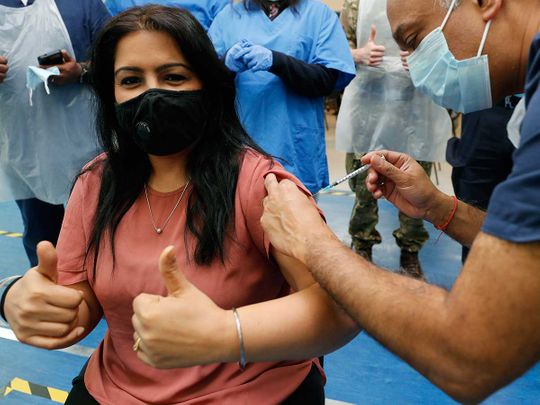
London: Boris Johnson’s government faces mounting calls to press ahead with lifting lockdown restrictions this month, after the UK recorded no new COVID-19 deaths for the first time since the pandemic began.
With the UK registering more than 127,000 coronavirus deaths since the start of the pandemic, the highest total in Europe, Tuesday’s figure is being viewed as a highly symbolic moment - even though the daily death toll is likely to creep up again due to reporting delays over last weekend’s public holiday.
The positive news has bolstered calls from business and members of Johnson’s Conservative Party for the government to go ahead with the fourth and final stage of unlocking the economy in England on June 21.
Health Secretary Matt Hancock said the zero fatalities figure showed the “vaccines are clearly working.” But he also urged caution, warning that Britain has not “beaten this virus yet” and urged people to get both doses.
Ministers will analyse data on hospitalisations and deaths over the next two weeks before making a decision, with a special focus on the impact of the so-called Delta virus variant first identified in India. Cases have been rising again in recent weeks, and the government wants to see that the link between infections and serious illness has been broken by the vaccination drive.
‘Freedom day’
The final stage of the “roadmap” aims to remove all legal limits on social contact, which would see nightclubs reopen, crowds pack out stadiums again, and large-scale weddings and festivals take place.
Pressure is building on Johnson to stick to the schedule. The Independent Business Network, which represents family-run firms, said the case for delaying the UK’s “freedom day” was “entirely without merit.”
“To not reopen would impede our economic opportunities and be devastating for sectors including entertainment and hospitality, who have already been decimated by three consecutive lockdowns,” IBN chairman John Longworth said in an emailed statement, adding that all of the most vulnerable people will have been vaccinated by June 21.
Pleas from business were backed up by John Bell, a professor of medicine at Oxford University who advises the government’s vaccine task force. The latest figures look “pretty good,” he told the BBC on Wednesday. “I’m pretty encouraged by what I see.”
‘Huddled Away’
Bell said a “balance” is needed as new strains emerge. “If we scamper down a rabbit hole every time we see a new variant, we’re going to spend a long time huddled away,” he said. “This disease is here to stay, probably forever.”
Iain Duncan Smith, the former Conservative leader, said the vaccines are proving to be a “very strong protection” against the virus. “What we’re doing here is we will be delaying for a reason that completely escapes me,” he told Times Radio.
The UK is expected to hit the milestone of three quarters of adults receiving their first dose of the vaccine on Wednesday, with Hancock expected to hail the achievements of scientists and the National Health Service at a speech to the Jenner Institute at the University of Oxford, which developed a coronavirus vaccine in collaboration with AstraZeneca Plc.
“I was told a vaccine had never been developed against any human coronavirus,” he will say, according to his office. “We dared to believe, and we started early.”








